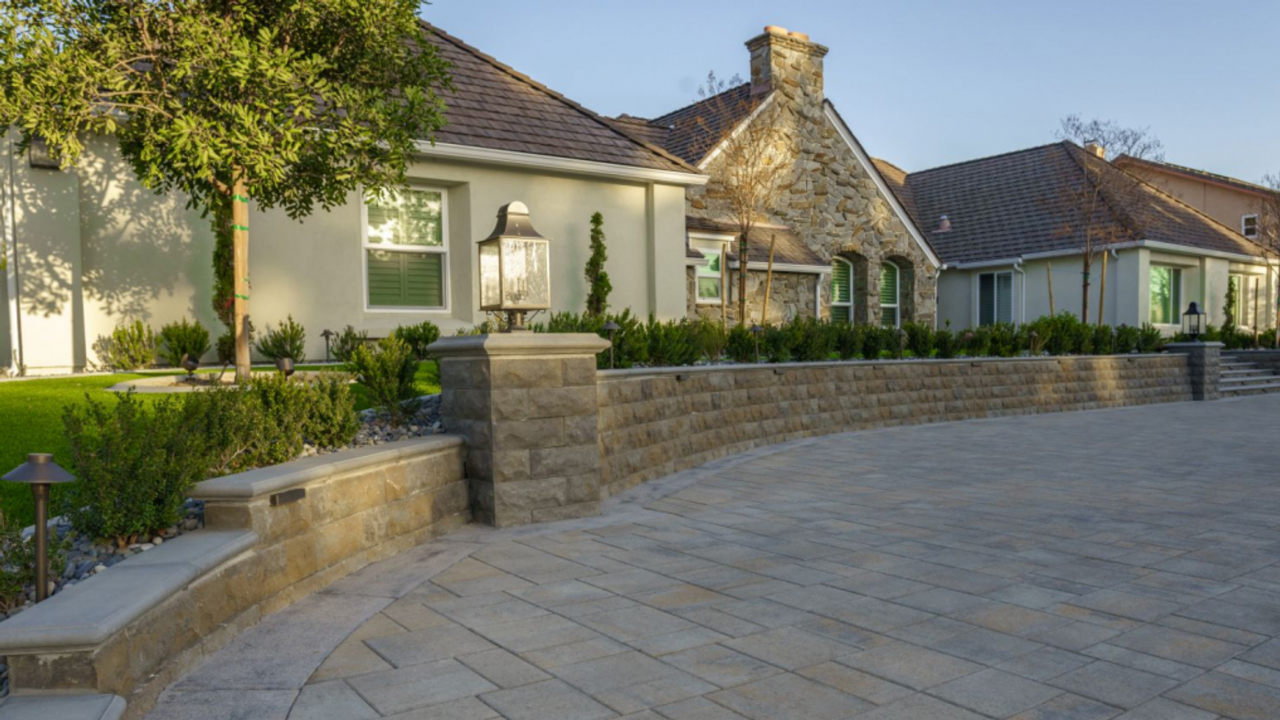When considering hardscape construction and landscaping projects, it becomes evident that retaining wallsRetaining walls are structures designed to hold back soil and prevent erosion in landscapes with var... hold a pivotal role in fortifying structural stability and elevating the aesthetic charm of outdoor spaces. These walls are expertly crafted to counteract the lateral pressures exerted by soil, simultaneously fashioning functional outdoor zones like terraces and gardens.
When tackling such endeavors, it is crucial to enlist the expertise of a seasoned hardscape contractor.
In this blog, we'll explore the pivotal significance of anchored retaining walls, delving into their robustness and steadfast stability, all of which significantly enhance outdoor living spaces' overall integrity.
An Insight Into Wall Construction
Retaining walls are not just functional; they also serve as design elements that enhance the outdoor space's overall aesthetics. These walls are commonly used to combat soil erosion, create levelA level is a tool used to determine whether a surface is horizontal (level) or vertical (plumb). It ... surfaces on sloping terrain, and define different areas within a landscape.
- Lateral Pressures - One of the primary challenges retaining walls face is the lateral pressures exerted by the surrounding soil. As soil builds up behind the wall, it creates horizontal forces that can push the wall outward or cause it to collapse if not adequately designed and constructed.
- Structural Stability - The structural stability of a retaining wall is crucial for its long-term performance. Walls that lack stability may lean, bulge, or fail altogether. Achieving structural stability involves considering factors like soil conditions, wall height, wall material, and proper drainage systems.
- Design Considerations - Designing a retaining wall involves multiple considerations. The wall's design must account for the anticipated lateral pressures, ensuring it can withstand the forces exerted by the soil it retains. Proper design also includes features like reinforcing materials and drainage systems to enhance stability.
The Role of Anchoring Systems
One key element in ensuring the strength and stability of retaining walls is the use of anchoring systems. Anchors are essentially rods or bolts that extend from the wall into the soil behind it.
These anchors provide additional support and resistance against lateral forces, helping prevent wall failure.
- Tensile Strength - Anchors are typically made of materials with high tensile strength, such as steelSteel is a strong, durable alloy made primarily of iron and carbon, commonly used in construction an.... Tensile strength refers to a material's ability to withstand a stretching or pulling force. Anchors with high tensile strength can effectively resist the lateral loads exerted by the soil.
- Types of Anchors - Different types of anchors can be used depending on the wall's design and the soil conditions. Some common anchor types include anchor rods, anchor bolts, and soil nails. The choice of anchor depends on factors like soil type, wall height, and design requirements.
- Proper Installation - Proper installation of anchors is critical to their effectiveness. Anchors must be installed at the correct depth and angle to provide sufficient support. Additionally, grout or concreteConcrete is a composite material made from a mixture of cement, sand, gravel, and water. It is one o... is often used to secure anchors in place and ensure they can withstand lateral forces.
- Hiring Experienced Contractors - Ensuring the correct design and installation of anchors requires the expertise of experienced hardscape contractors. These professionals understand the principles of structural stability and can design retaining walls that incorporate the necessary anchoring systems for long-lasting performance.
Structural Integrity and Outdoor Living SpacesOutdoor living spaces are areas designed for comfort and entertainment in the open air, often functi...
Retaining walls are not just structural elements; they also contribute significantly to the overall integrity of outdoor living spaces. A well-designed and anchored retaining wall enhances safety, prevents soil erosion, and creates level areas for various outdoor activities.
Whether it's a terraced garden, a patio, or a seating area, retaining walls provide the foundation for functional and inviting outdoor spaces.
- Safety Factors - A properly anchored retaining wall enhances safety by preventing soil collapse and erosion. This is especially important in areas with steep slopes or loose soils, where retaining walls play a crucial role in stabilizing the landscape.
- Usable Living Space - Retaining walls transform challenging landscapes into usable living spaces. They create level surfaces for gardening, outdoor dining, or simply enjoying the scenery. With the right design and anchoring, retaining walls maximize the potential of outdoor areas.
- Aesthetic Appeal - Retaining walls are not limited to their functional role; they also contribute to the aesthetic appeal of outdoor spaces. Well-designed walls can add beauty, texture, and visual interest to a landscape, enhancing its overall ambiance.
- Inviting Atmosphere - Anchored retaining walls can be designed to incorporate seating, lighting, and other elements that make outdoor spaces more inviting. They serve as a foundation for creating cozy and welcoming areas for gatherings and relaxation.
Structural Considerations for Longevity
When planning outdoor projects that involve retaining walls, it's essential to consider the structural aspects carefully. Retaining walls, whether used for aesthetic or functional purposes, must be designed and constructed to withstand the forces acting upon them.
- Design Variables - Several variables impact the structural integrity of retaining walls. These include the type of soil, the slope of the terrain, the height of the wall, and the type of retaining wall material. An experienced hardscape contractor can assess these factors to design a retaining wall that meets the specific requirements of your outdoor space.
- Design Loads - Designing a retaining wall involves considering the various loads it will need to support. This includes the weight of the soil it retains, the weight of any structures or landscaping features placed on top of the wall, and the lateral forces exerted by the soil. Calculating these loads accurately ensures that the wall can withstand the pressures without compromising its stability.
- Safety Factors - Engineers and contractors typically incorporate safety factors into the design to account for uncertainties or variations in load conditions. Safety factors provide an additional margin of safety, ensuring that the retaining wall can handle unexpected loads or changes in soil conditions.
- Materials and Construction - The choice of materials for the retaining wall is critical. Common materials include concrete blocks, natural stone, and timber. The material must be selected based on its suitability for the specific site conditions and design requirements. Additionally, proper construction techniques, including the use of anchors, drainage systems, and compacted backfill, are essential for the wall's longevity.
Unlock the Full Potential of Your Outdoor Space with West Hills Masonry
Retaining walls are a significant investment in your outdoor space, and their strength and stability are paramount. To ensure the structural integrity of your retaining wall and create a durable, inviting outdoor living area, it's crucial to collaborate with experienced hardscape contractors who specialize in retaining wall design and construction.
With West Hills Masonry as your trusted partner, you can transform your outdoor space with confidence. Our team of professionals possesses the expertise to assess your site's unique characteristics and design retaining walls that meet the highest standards of structural integrity and aesthetic appeal.
Are you ready to enhance the strength, stability, and beauty of your outdoor space with professionally designed and constructed retaining walls? Trust West Hills Masonry, your experienced hardscape contractor, to transform your vision into reality. Contact us today at 714-519-5009 to schedule a consultation and unlock the full potential of your outdoor living area.

 Carlos Gonzales
Carlos Gonzales